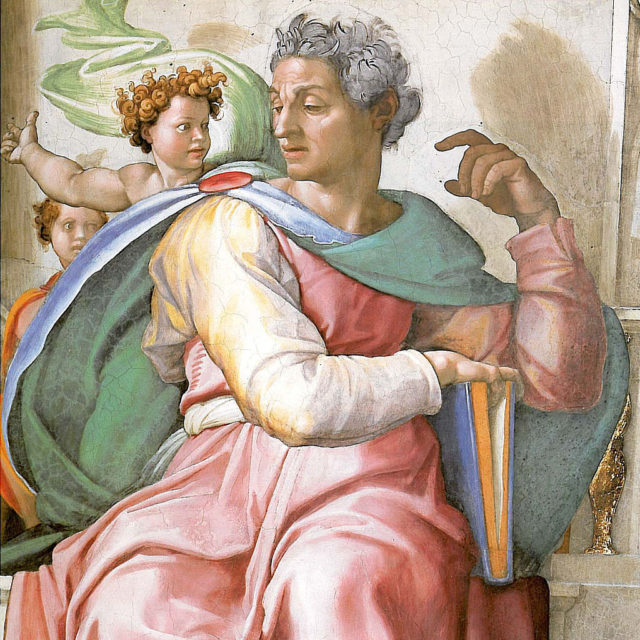The Catechism of the Catholic Church states, “‘[t]he musical tradition of the universal Church is a treasure of inestimable value, greater even than that of any other art. The main reason for this pre-eminence is that, as a combination of sacred music and words, it forms a necessary or integral part of solemn liturgy.’ The composition and singing of inspired psalms, often accompanied by musical instruments, were already closely linked to the
liturgical celebrations of the Old Covenant. The Church continues and develops this tradition: ‘Address…one another in psalms and hymns and spiritual songs, singing and making melody to the Lord with all your heart.’ ‘He who sings prays twice’” (1156).
As members of the Holy Church we are called to honor, take part in, contemplate, and pass on her rich treasures and traditions, and to reflect the love and longing for Christ that they so beautifully express.
In this lesson, students will hear a beautiful musical setting of a passage from the Prophet Isaiah, written by the Catholic composer, William Byrd (ca. 1540–1623). They will then reflect on their experience of it, and discuss how the musical setting of this Scriptural text helps to affirm, celebrate, or illuminate our Holy Catholic Faith.
The Call of Beauty: “Ne Irascaris, Domine”
Insert Liturgical Connection Title Here

This lesson is for:
Tagged as
Lesson Overview
Lesson Materials
A. Begin by writing on the board the following question: What is a contrite heart? Ask students to provide potential answers, and write their answers on the board. B. Then, explain that one has a contrite heart when they feel sorrow or regret for their sins or offenses. To be contrite means to be penitent. A contrite heart is what prompts us to seek God’s great mercy and forgiveness in the Sacrament of Penance and Reconciliation (Confession). Remind your students that Jesus is always waiting for us to come to Him in the Sacraments. He has told us in Scripture “Those who are healthy do not need a physician, but the sick do. I have not come to call the righteous to repentance but sinners” (Luke 5:31–32). For this reason, we publicly call to mind our sins and faults at every Mass during the Liturgy of the Word, acknowledging our need for mercy, compassion, and intercession. C. Next, distribute the Warm-Up activity and have your students read the Scripture passages and either silently or in small groups answer the focus and reflection questions. D. When they have finished, call on students or groups to share their answers as part of a class discussion on what it means to be contrite, poor of spirit, and lowly, and what these attributes look like. E. Review and explain that our habits form us, one way or the other. Praying with and reflecting on beautiful sacred music will exercise our capacity for awe, wonder, delight in goodness and truth, and increase our desire, or appetite, for beauty itself. Sacred music gives expression to both our joys and our sorrows as children of God; it gives voice to our penitence and our praise, aids our prayer, and disposes our hearts to experience God’s love and abundant mercy. F. Then, have students read both the English and Latin text in the Ne Irascaris Domine activity. Have them compare both texts and circle any Latin words that they can recognize in relation to the English translation. Ask students to share the words they recognize. G. For context, you may wish to explain that these verses from the prophet Isaiah were composed when the people of Israel were in captivity in Babylon, almost 600 years before Christ. Conquered and captive, they were hundreds of miles from the Temple in Jerusalem, which the Babylonians had sacked. This forced exile was understood by the Israelites as a punishment for having turned away from God to live by their own desires and worship false idols. It was a period of great sorrow and lamentation. But Isaiah was called by God to remind the Israelites that though they had turned away from God and His law, they had not been forgotten by Him. His promise of redemption would be fulfilled. These verses we will hear from Isaiah are a cry of anguish to God from crushed and contrite people. We know something of this cry at times too, for we walk through a “valley of tears” in this life, and sometimes we find ourselves far from God because of our sins. Yet God is never far from us, and He is always waiting for us to return to Him. Because of His goodness and mercy, we journey in hope towards Heaven, where there will be no more grief but only endless love, joy, and adoration. H. Next, create a prayerful atmosphere and play for the class the recording of “Ne Irascris Domine” & “Civitas Sancti Tui” (you may project the video of the singers, or just have students listen to the recording. Either way it is recommended that you use external speakers in order for your students to experience the full effects and nuances of the recording). Ask students to follow along with the Latin text to the best of their ability as they listen to the prayer. You may wish to play it more than once. You may also wish to encourage your students to pray along with the recording. I. Finally, have your students answer the reflection questions individually. When they have finished, call on students to share their answers, sharing your own thoughts and reflections on the piece as you work through the questions with them.Teacher Directions
Resources
Activities:
Answer Key:
Warm-Up
Ne Irascaris Domine by William Byrd

